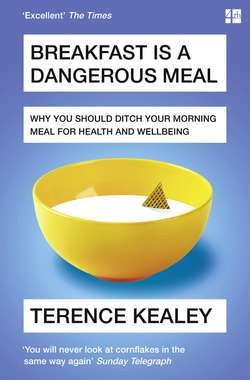Читать книгу Breakfast is a Dangerous Meal: Why You Should Ditch Your Morning Meal For Health and Wellbeing - Terence Kealey, Terence Kealey - Страница 6
Prologue
ОглавлениеI was contracted to submit the first draft of this manuscript to my publishers on 31 January 2016. The day before, on 30 January, The Times trailed on its front page an article by Angela Epstein, a health journalist, entitled ‘Eight great weight-loss myths’. Skipping breakfast was myth number four:
A recent study by Louisiana State University found that a 250-calorie serving of oatmeal [porridge] for breakfast resulted in reduced calorie intake at lunch.
Some people like to do the crossword, but my morning hobby is to find the catch in claims that breakfast is good for me, so where was this article’s catch? I had twenty-four hours in which to uncover it.
It wasn’t hard to locate the study, which had just been published in the Journal of the American College of Nutrition, where I discovered that it had actually come jointly from Louisiana State University and PepsiCo (which owns the Quaker Oats Company).1 That is obviously a different provenance than from Louisiana State University alone.
The study showed, moreover, that, compared with a breakfast of Honey Nut Cheerios, a bowl of Quaker Instant Oatmeal slightly reduced the amount eaten subsequently at lunch; but the study did not compare subjects who ate a bowl of Quaker Instant Oatmeal with those who’d actually skipped breakfast, because no subjects were asked to skip it. Why not?
Well, it so happens that, contrary to what most people believe, eating breakfast significantly increases your total intake of calories: though eating breakfast may reduce your calorie intake at lunch, the calories you consume at breakfast will greatly exceed the ones they displace at lunch. So a fuller Times report of the study in the Journal of the American College of Nutrition might have read:
A recent study by Louisiana State University that was funded by – and performed jointly with – PepsiCo (which owns the Quaker Oats Company) found that a 250-calorie serving of oatmeal for breakfast resulted in a slightly reduced calorie intake at lunch compared with an equivalent serving of Honey Nut Cheerios. Eating any cereal, however, greatly increases the total daily calorie intake, and only if breakfast were actually skipped would the total calorie intake have fallen.
That little story summarises this book.
